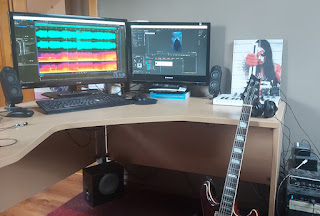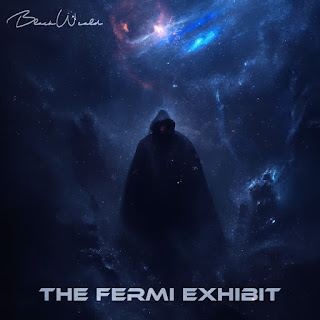Dark Ambient: BlackWeald Interview (original) (raw)
Interview by Casey Douglass
BlackWeald is a dark ambient and experimental music creator that has produced some truly monumental albums for fans to enjoy. His latest release: The Fermi Exhibit, is themed around the Fermi paradox, which in the broadest of terms, is the question of why we haven’t detected alien life. In this interview, we talk about how he became interested in the Fermi paradox, and what his thoughts are about some of the “solutions”. We also delve into the role that Lovecraft’s fiction has played in his creative life, the value of ambiguity in creating, and what kind of equipment he uses to create his dark marvels. Thank you for reading and I hope you enjoy.
(Photos used throughout provided by BlackWeald. They depict some of the views from his local surroundings).
***
Casey: As we begin this interview, you are just over one week away from releasing your latest music creation:The Fermi Exhibit. It’s a dark ambient album themed around the Fermi paradox, the mental itch in scientists’ brains about why the sheer size of the universe lends itself to the idea that advanced extraterrestrial life should be commonplace, but that we seem to catch no sight nor sound of them. How and when did you first become interested in the Fermi paradox and what is your favourite potential solution?
BlackWeald: I was always interested in anything dark, morbid or mysterious. The nature of life, consciousness, and the insane scale of the universe are of course the oldest of these enigmas, also the toughest to get your head around.
I must state that I do not believe in intelligent design. Sure, it seems like the universe is fabricated in a way to facilitate human needs. You know the argument, if you’d change any universal constant (speed of light, Planck constant, ratio of matter-antimatter, etc.), the universe would be so different, that e.g. planets would not form, and no life would be possible. But I believe the answer for this isn’t intelligent design, rather it’s science’s most beautiful theory, the Anthropic principle. If the universe would NOT suit us, we wouldn't be here to observe it. There might be a crap-load of universes with different values of these constants, but there would be no life in them, and no observer in them to say “Hey, it seems to be 100% designed for us!”. So it’s the other way around. It’s not that the universe is designed to our needs, but we are like we are, because the universe is the way it is.
Back to the Fermi Paradox, although there are fascinating esoteric answers (which the album mostly deals with), the truth is probably much more mundane. And most likely the truth does not lie within ONE of these “solutions”, but a combination of the few. Perhaps interstellar travel simply cannot be solved, and you cannot bypass the speed of light anyhow. Combine this with the vastness of the universe and how specific a planet needs to be, to be able to develop and sustain even the most primitive life. These together would mean that although there are/were intelligent species, they are so far away from each other, that we would never ever be able to witness their existence, let alone communicate with them. It’s like an ant and a penguin inhabiting Earth alone, one in Europe, one in Antarctica. What are the chances they’d ever meet? The ant barely lives a year, they could not travel that far on land, there is the impassable ocean between them, and even if they met, they would not even recognize each other as another living being (despite these two examples descending from the very same tree of life).
In short, sure, there must be similarly intelligent life out there, but I doubt two of these species would ever come in contact with each other.
Casey: In an interview you gave toDarkUndergroundMusicZine, you touched upon your love of H.P Lovecraft. Do you enjoy contemplating the Fermi paradox because it in some ways touches the notion of cosmic horror that Lovecraft so adeptly describes, that sense of awe at the momentous forces and vast distances involved?
BlackWeald: I adore his work, he is my favourite writer. Anything Lovecraftian you can throw at me and I’ll probably like it. But I have to agree with the general consensus that he isn’t technically the best writer, rather it’s the “universe” he created and the way he tells his stories, that’s what really resonates with me. It’s very much like what Hidetaka Miyazaki does with his games. You have to piece the puzzle yourself, and even then, many things are left ambiguous. Which is great, because you can put your own thoughts, fears, feelings into these stories, making them personal. Anything that’s too straightforward, without any room for imagination, well, those are just stories. Unlike these ambiguous works, which create a framework, then it’s up to you to fit yourself into that.
I think this is what Lovecraft gets right. Instead of spoon-feeding you something tangible that he finds scary, he rather makes you think about a concept that might kick your existential dread in. “The universe is incomprehensibly large, and compared to that, you are incomprehensibly small. What do you think about it?” or “Have you ever thought of ancient civilizations that were once thriving but now are buried underneath the soil?” These are more inspirational thoughts than anything.
I mean, one could say that Lovecraft himself made specific monsters, but I think even though we have a quite universally agreed representation of Cthulhu, it’s more about “What might lie beneath” than an actual monster.
Next to ambiguity, it’s important for me (either as a story-teller, or as a consumer) to actually take part in putting the story together, as opposed to just being told about the story. There is a very thin line between the two. Like, in a movie, when two dots should be connected, do you leave it up to the viewer to make that connection? You can give the viewer a flashback scene, or make a character say it out loud, but then the viewer does not actually participate in solving the mystery. But if you give them less, and let them figure it out, they will be like “Aha!” and it’s immediately more engaging.
Regarding how it’s tied to BlackWeald, I usually try to make my musical output ambiguous enough that there is always some room where the listeners can project themselves into. Some riddles to be solved, some connections to make yourself, something hidden, stuff that is not so obvious. This is why the song titles on_The Fermi Exhibit_ are a bit shady. “Civilizations might be too far away from each other” not only sounds shit, but leaves no room to figure out what the song represents.
Of course it does not apply to all BlackWeald releases, e.g. Leonov and She and the Devil’s Sons_follow a specific narrative, but I think it applies well for most of the others. Maybe on the “_From Dust..” album the ambiguity went a bit too far and without the additional text, the framework of the album might not get through (the analogy between the timeline of a day and the timeline of a life). But e.g. with Sedna I tried to approach it in a Lovecraftian way. You know what happened, you know what it is capable of, but it’s up to you to imagine what it actually might be.
Casey: Why did you decide to form The Fermi Exhibit in the style of a museum exhibit, and what do the different sections represent?
BlackWeald: In short, if someone would have put a pistol to my head saying “You have to cut the album down to 2 hours!”, I would have chosen the first 13 tracks of the album. Fortunately I don’t have to tailor my output to any restrictions.
As a longer story, I started working on this album almost 3 years ago, right after 666 Minutes in Hell. As it happens often to me, a seemingly quick project turned into a huge monster. In a few weeks I found myself having 2000+ sound fragments and about 30 song concepts. Shaping it into finished songs seemed impossible and the weight of the project felt unbearable. So first I thought I’d slice the work up and have it released in a series of EPs. Then I got caught in the flow and during months of never-ending sessions, I finished everything at once.
When I saw that it turned out to be 8 hours long, I started cutting the fat off several songs and even threw away complete songs. I narrowed it down to 2 hours, having like a “best of” version of all the composed material, but I started missing many of the leftover material. I found myself listening to the “B-sides” more than the rest, so I just said “fuck it” and decided to keep quite a few of them. Today, I still have my own favourites in the more experimental, longer, less “traditional ambient” tracks. All that remains of this back-and-forth hassle is those two lines regarding the first 13 tracks being the “main hall” and the rest existing on the “gallery annex” of the exhibition.
Oh, and why an exhibition? Most of the stuff I release has some kind of narrative going through the whole album, but this one is among the few that is “just a bunch of tracks without any connection between them”, except for, of course, the overarching theme of the Fermi Paradox. My brain felt that I still needed to give the album a frame, which is this virtual exhibition, where each track is like a painting hanging on the wall, representing one solution to the Fermi Paradox.
Casey: When talking to The Dungeon in Deep Space, you explained that your music is created in a no budget, lo-fi kind of way, using an old PC, only using the integrated sound-card etc. Is this still the case, and what do you think that this minimalistic style of creation does for your creativity? I do a similar thing myself but it’s mainly to avoid overwhelm, perfectionism, and my OCD kicking my backside up and down all day long.
BlackWeald: Yeah, it’s still pretty much the case, although my PC aged 2 additional years, so it’s now 12 years old. Makes video rendering take ages. Although I bought the cheapest Behringer soundcard, so guitars and vocals can be recorded slightly more easily, but there are neither of them on The Fermi Exhibit.
The “no budget” nature is by my circumstances, not by my will. I’d love to have a dedicated room full of instruments and synths, having a top tier computer, etc, but that’s not my reality. Still, if you want to, you actually can compose and release with minimal gear and finances. Anyone saying otherwise is fooling themselves. My first few releases were made without a DAW, using only Audacity. Of course the methods used limit what the outcome can become. But, it is what it is.
Most of my favourite artists made music this way anyways. Sure, Swans has top tier gear, experience and several human talents behind them, but Dylan Carlson makes music almost all by himself, often with a single guitar only. Similarly, Hate Forest is practically one guy writing the best riffs ever and uses a drum machine. If my own favourites are often just “a dude with a guitar”, why would I fool myself thinking that gear matters the most.
I myself tend to overthink stuff by nature, so I have to keep pushing myself to accept “It’s good enough, move on!”. But also, restrictions can spark up creativity, whether they are artificial or not. So anyone planning a compilation work, feel free to ping me, as I love these kinds of works!
***
Thanks so much to BlackWeald for his time spent answering my questions. If you would like to check out The Fermi Exhibit, you can find it on Bandcamp at this link.





